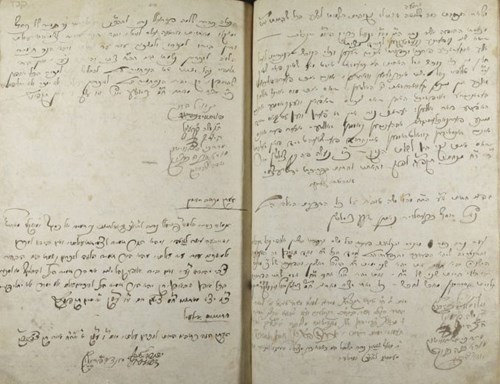In the late 17th century, the town of Zülz – known today as Biała Prudnicka in Poland – became a rare haven for Jews living in Europe. The local government granted the Jews the right to enter the trade business making them equal in commerce rights to the local Christian merchants. This permission was unique at the time and it stimulated Jewish immigration to the region at the beginning of the 18th century.
For the Jewish community of Zülz, adherence to a strict set of laws established by the community leadership was critical to protecting the traditional way of life and ensuring the safety and security of the community. These laws – and the punishments exacted against those who transgressed – were clearly delineated in the community Pinkas, a registry used to coordinate and document community activity.
The Zülz Pinkas, dated from 1796 to 1805, was written in a combination of languages including German, Yiddish, and Hebrew. The Pinkas holds the official listing of the local rules including the criteria for admission into the community, basic guidelines on how to live daily life, and the process of receiving the appropriate permissions to marry as a method of controlling population growth as demanded by the Prussian government. The Pinkas also includes the rules regarding the management of a local pub that was owned by the Jewish community and was leased out to community members for the purpose of making a profit.
For the leadership of the Jewish community, game playing, be it board games, card games or gambling, was strictly forbidden due to the fear that it would lead to immodest or promiscuous behavior. The strict condemnation against game playing was waived ever so slightly for women who had recently given birth. If a postpartum woman had friends come to visit, the group was permitted to play games and pass the time together under the assumption that men would not be present. Interestingly enough, games were also permitted to be played on Purim, a day of festive drinking and celebration in Jewish tradition.
Those caught playing games in circumstances where games were not permitted were faced with the greatest of punishments: a high fine to be paid to the community fund. Now, for the wealthy members of the community, this was not an issue and many played games at will, but for the poor, this punishment was extreme and had a strong impact on their financial status.
Years after the passing of the rule against the frivolity of game playing, the community felt the regulation was too strict and needed revision. The Pinkas describes the review process the leadership went through in reconsideration of this law. The council decided that on days where the prayer of Tachanun, a prayer of supplication, is not recited (Shabbat, holidays and special occasions), the community could be permitted to play games, assuming they were played with the right precautions in place against inappropriate interactions.
The Jewish people in Zülz were also very dedicated and stringent with the rules when it came to their observance of the Passover holiday. Every year ahead of Passover, as they were not permitted to have their own mills, the community would be granted access to one of the local flour mills for the purpose of grinding the flour to be used for preparing Matzah, the unleavened bread traditionally eaten on Passover. A member of the community would be appointed as the Mashgiach, the person in charge of supervising the process to ensure the flour is not contaminated in any way.
The Pinkas describes how, in 1798, the Mashgiach was punished as he was not stringent enough or attentive enough in his assignment. While his punishment is not laid out in the text, based on the punishments for far lesser crimes, we can assume it was of the highest order.
While the Jewish community of Zülz ceased to exist more than 100 years ago, the Pinkas held by the Central Archives for the History of the Jewish People paints a picture of a rich community life and a leadership that was dedicated to its congregation- so long as you were willing to follow its rules.
פנקס קהילת צילץ






